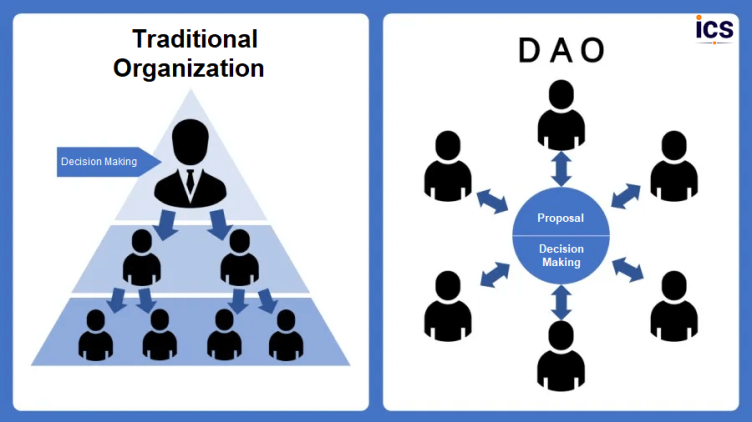Part 1: Decentralized Autonomous Organization
What is a DAO?
A DAO is a Decentralized Autonomous Organization. It is an organization that is run by rules encoded as computer programs called smart contracts. A DAO’s financial transaction record and program rules are maintained on a blockchain.
A DAO is self-governing and is directly managed by its members through a transparent voting process. Once a DAO’s rules are created, they cannot be changed unless a majority of its members agree to the changes.
These actions occur on-chain, meaning they are executed and recorded on the blockchain. This allows for a high degree of transparency and trustless collaboration.
What problem does DAO solve compared to traditional organizations?
Traditional organizations are centralized and hierarchical and are run by a small group of people who make decisions on behalf of the organization. This structure is prone to corruption and inefficiency.
DAOs cut out middlemen, ensuring trustless decision-making on the blockchain. The decentralized ledger allows anyone to input, but entries remain unalterable. This guarantees universal verification of all DAO transactions, including on-chain votes, asset transfers, token mints, and more.
What are the benefits of DAO?
- Transparency: All transactions are recorded on the blockchain and can be viewed by anyone. Everything from treasury holdings to payment flows is visible to everyone globally.
- Trustless: No need to trust a central authority to enforce decisions. The rules are enforced by smart contracts.
- Decentralized: No single point of failure. No single point of control. No single point of attack. No single point of corruption. No single point of censorship.
- Autonomous: No need for human intervention. The rules are enforced by smart contracts. We can trust the code since it is programmed to be fair and transparent.
- Immutable: Once a rule is created, it cannot be changed unless a majority of members agree to the change. This prevents corruption and ensures fairness.
- Secure: All transactions are recorded on the blockchain and cannot be altered or deleted. This prevents fraud and ensures transparency.
- Efficient: No need for middlemen to enforce decisions. Since all transactions are recorded on the blockchain, there is no need for auditing or accounting services. This saves time and money.
Conclusion
DAOs are a new way of organizing people and resources. They are governed by rules encoded as smart contracts. These rules are enforced by the blockchain. DAOs are transparent, trustless, decentralized, autonomous, immutable, secure, efficient, and scalable.
Hope you have gained basic knowledge of DAO. If you have any questions, please feel free to ask them in the comments section.
We will discuss different use cases where DAO can be utilized & some of the challenges of DAO. Stay tuned for Part 2.

Leave a Reply